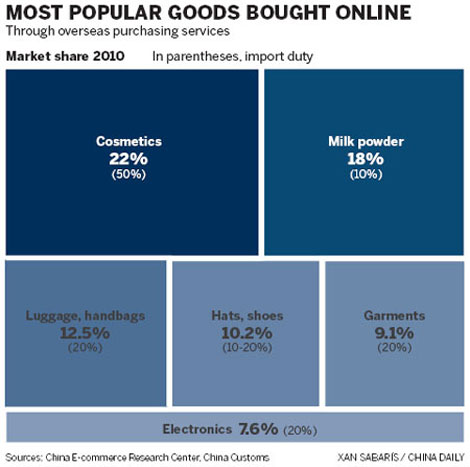Technology
Looking abroad
Updated: 2011-02-25 11:14
By Gao Qihui (China Daily European Weekly)

Competition and taxes
The increasing popularity of overseas purchasing services has led to business opportunities for new agents - and, in its own way, China Customs.
A Web search for shops related to "US purchasing agent" at taobao.com, owned by Alibaba Group Holding Ltd and China's largest e-commerce site, yields 3,937 shops. A search for "South Korea purchasing agents" yields 8,240 shops.
That means more and fiercer competition for the agents.
"I opened my online shop six months ago, but I have not received any orders," says Zhao Qian, 21, who owns an overseas purchasing e-shop at taobao.
A regulation that China Customs introduced in September is adding price pressure for overseas purchasing agents, most of whom are individual operators.
The agents or their overseas partners mail most products to the Chinese mainland as personal articles to evade customs duties, essentially turning the transactions into a black market, says Fang Yingzhi, an analyst with the center.
Previously, customs duty on mailed personal items was waived if it was 500 yuan or less. Now, the exemption limit is 50 yuan. And the duty on cosmetics, the most popular type of overseas purchase, is 50 percent.
For example, a bottle of sunscreen, which is categorized as a cosmetic, costs 800 yuan. A duty rate of 50 percent makes the duty 400 yuan. Under the old rules, that duty would be exempt because it fell under the 500 yuan limit. Now it exceeds the limit of 50 yuan, making the cost of that mailed bottle of sunscreen much higher.
It might truly be for personal use, but China Customs assumes that the sunscreen and similar mailed items are intended for resale. Customs explains on its website that such goods "have the nature to gain profit" and will enter the trading circle again.
The duty exemption is higher, at 5,000 yuan, for agents who personally bring the overseas products from abroad rather than mail them.
Agents feel it
The selling price set by overseas purchasing agents usually includes the original purchase price in the overseas market, local excise tax there, freight costs, the import tariff and a service charge, says usashopcn.com's Shi.
The new import duty on mailed items gives three choices to purchasing agents: Raise prices on the high-duty items, spread that extra cost over a wider array of items, or take a loss.
"My business is definitely affected by the regulation," says Li Xiaolu, a Chinese immigrant living in New York. "The cost rises and the profit goes down."
Li, who started her business in September 2009, thinks it will be more difficult for her to continue the service due to fierce competition and what she considers an unfavorable import duty.
The advantage goes to agents with big overseas purchasing services.
Whether the agents have a stable supply of goods or buy the goods at lower prices are key elements in the industry, says Su Huiyan, an analyst with Shanghai-based iResearch. The big agents can buy directly from the brand owners, Su says, but small ones can buy only from dealers or even the supermarket - at higher prices.
And agents who deal with a wide variety of goods can adjust the prices in some categories to make up for lower profit in others, or can shift their business to product lines that are less affected by the higher duties. Agents with small operations often do not have those options.
Su also says that the new customs regulation will not affect the large, professional overseas purchasing companies because they generally have declared imported products at customs all along.
But customers still come out ahead. Even with the import duty included, the ultimate price of most products bought from overseas is still lower than the price in domestic franchised stores. CERC says it in its report. The domestic price is higher now because it includes the import tariff, too.
Wu Ning, an individual agent who has purchased products from Hong Kong for more than a year, says, "As long as the tax imposed by the customs stays at this level, the demand for overseas purchasing service will not decline."
CHANGE IN THE MARKET
It will, however, lead to a shuffling in the market, says CERC analyst Fang. And CERC's report says that will mean an improvement over time, because it will eliminate small agents who cannot guarantee product quality or provide service after the sale.
Some foreign brand owners are moving to e-commerce on the Chinese mainland to cut the cost of distribution, says Wang Rulin, the standing deputy director of the Committee of Experts on Mobile Commerce at China E-Commerce Association.
These international brands are looking to cooperate with Chinese websites so they can hand over the sales process to the websites who can directly sell products to consumers without the involvement of dealers. Nokia and Motorola are already working with Ying Chang Xin Da, an e-commerce provider that runs a commercial website for mobile phones.
"That will save a considerable expense on rent and management of a storefront and can provide for home-delivery service," Wang says.
As the websites gain support from the foreign brand owners, the quality and after-service of products sold by these agent websites can be guaranteed, Wang says.
Specials

Kremlin buddies
Dmitry Medvedev and Vladimir Putin inspect Olympic preparations.

Lantern Festival
The Lantern Festival is celebrated across China.

New York Fashion Week
Models line up before a show during New York Fashion Week.